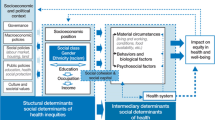Abstract
Moving On Initiatives (MOIs) assist individuals with the transition from permanent supportive housing to mainstream housing without the embedded supports. This emerging innovation has the potential to increase behavioral health system capacity and provide recipients with the opportunity to live in the least restrictive setting. However, few empirical studies have examined MOIs, and little is known about the implementation challenges providers face and strategies they use to realize these initiatives in practice. To identify these challenges and strategies, this study utilized over 2 years of observations at MOI “learning collaboratives,” as well as eight focus groups with implementation stakeholders. Analyses informed by the Consolidated Framework for Implementation Research (CFIR) identified challenges in the outer and inner service settings, as well as at the individual and innovation level. Outer setting challenges were most prominent in the data, and one non-CFIR construct, macrosystemic characteristics arose inductively. Implications for behavioral health policy and practice are discussed.

Similar content being viewed by others
References
Benston EA. Housing Programs for Homeless Individuals with Mental Illness: Effects on Housing and Mental Health Outcomes. Psychiatric Services. 2015;66(8):806-816.
Culhane DP, Metraux S, Hadley T. Public Service Reductions Associated with Placement of Homeless Persons with Severe Mental Illness in Supportive Housing. Housing Policy Debate. 2002;13(1):107-163.
Martinez TE, Burt MR. Impact of Permanent Supportive Housing on the Use of Acute Care Health Services by Homeless Adults. Psychiatric Services. 2006;57(7):992-999.
Rog DJ, Marshall T, Dougherty RH, et al. Permanent supportive housing: assessing the evidence. Psychiatric Services. 2014;65(3):287–294.
Wright BJ, Vartanian KB, Li HF, et al. Formerly Homeless People Had Lower Overall Health Care Expenditures After Moving Into Supportive Housing. Health Affairs. 2016;35(1):20-27.
U.S. Department of Housing and Urban Development. The 2018 Annual Homeless Assessment (AHAR) Report to Congress. Washington, DC: U.S. Department of Housing and Urban Development; 2018.
Corporation for Supportive Housing. Moving On. 2018. https://www.csh.org/moving-on. Accessed August 14, 2018.
U.S. Department of Housing and Urban Development. FY 2019 Continuum of Care (CoC) Application. Washington, DC: U.S. Department of Housing and Urban Development, Office of Special Needs Assistance Programs; June 28, 2018.
Scott AL, Kristel OV, Szymanski, AM. United Supportive Housing System (USHS) Move Up pilot—evaluation report. 2012. http://docs.csb.org/file-USHS-Move-Up-Pilot-Program-Report-Final.pdf. Accessed August 14, 2018.
Harder and Company. “Moving On” from supportive housing evaluation report. 2016. http://www.csh.org/wp-content/uploads/2016/07/CSH-LA-Moving-On-Final-Report_06.30.16_EW_AE.pdf. Accessed August 14, 2018.
Proctor E, Silmere H, Raghavan R, et al. Outcomes for implementation research: conceptual distinctions, measurement challenges, and research agenda. Administration and Policy in Mental Health and Mental Health Services Research. 2011;38:65–76.
Stetler CB, Legro MW, Wallace CM, et al. The role of formative evaluation in implementation research and the QUERI experience. Journal of General Internal Medicine. 2006;21:S1.
Padgett, DK. Qualitative methods in social work research (3rd ed.). Thousand Oaks: Sage, 2017.
Corbin J, Strauss A. Grounded theory research: procedures, canons and evaluative criteria. Qualitative Sociology. 1990;19:418–427.
Strauss A, Corbin J. Basics of qualitative research (2nd ed.). Thousand Oakes: Sage, 1998.
Damschroder LJ, Aron DC, Keith RE, et al. Fostering implementation of health services research findings into practice: a consolidated framework for advancing implementation science. Implementation Science. 2009;4:50–64.
Crabtree B, Miller W. Doing qualitative research. Newbury Park: Sage, 1992.
MacFarlane A, O’Reilly-de Brún M. Using a theory-driven conceptual framework in qualitative health research. Qualitative Health Research. 2012;22:607–618.
Coordinating Agency, personal communication, August 10, 2018
Greenberg D, Gershenson C, Desmond M. Discrimination in evictions: empirical evidence and legal challenges. Harvard Civil Rights-Civil Liberties Law Review. 2016;51:115–158.
Pager D, Shepherd H. The sociology of discrimination: racial discrimination in employment, housing, credit, and consumer markets. Annual Review of Sociology. 2008;34:181–209
Hutt M. This house is not your home: litigating landlord rejections of housing choice vouchers under the fair housing act. Columbia Journal of Law and Social Problems. 2018;51:391–429.
Hamilton AB, Mittman BS, Campbell D, et al. Understanding the impact of external context on community-based implementation of an evidence-based HIV risk reduction intervention. BMC Health Service Research. 2018;18:11.
Powell BJ, Beidas RS, Rubin RM, et al. Applying the policy ecology framework to Philadelphia’s behavioral health transformation efforts. Administration and Policy in Mental Health and Mental Health. 2016;43:909–926.
Raghavan R, Bright CL, Shadoin, AL. Toward a policy ecology of implementation of evidence-based practices in public mental health settings. Implementation Science. 2008;3:26.
Denzin, NK. The research act: a theoretical introduction to sociological methods (2nd ed.). New York: McGraw-Hill; 1978.
Paradise J, Ross DC. Linking Medicaid and supportive housing: Opportunities and on-the-ground examples. 2017. https://www.kff.org/report-section/linking-medicaid-and-supportive-housing-issue-brief/. Accessed August 14, 2018.
Tiderington E. “We Always Think You’re Here Permanently”: The Paradox of “Permanent” Housing and Other Barriers to Recovery-Oriented Practice in Supportive Housing Services. Administration and Policy in Mental Health and Mental Health Services Research. 2017;44(1):103-114.
Acknowledgments
The authors would also like to acknowledge the contributions of the study participants and the assistance of CSH (Corporation for Supportive Housing) in the execution of this project.
Funding
This research was supported by a grant from the Oak Foundation.
Author information
Authors and Affiliations
Corresponding author
Ethics declarations
Conflict of Interest
The authors declare that they have no competing interests.
Additional information
Publisher’s Note
Springer Nature remains neutral with regard to jurisdictional claims in published maps and institutional affiliations.
Rights and permissions
About this article
Cite this article
Tiderington, E., Ikeda, J. & Lovell, A. Stakeholder Perspectives on Implementation Challenges and Strategies for Moving On Initiatives in Permanent Supportive Housing. J Behav Health Serv Res 47, 346–364 (2020). https://doi.org/10.1007/s11414-019-09680-6
Published:
Issue Date:
DOI: https://doi.org/10.1007/s11414-019-09680-6




